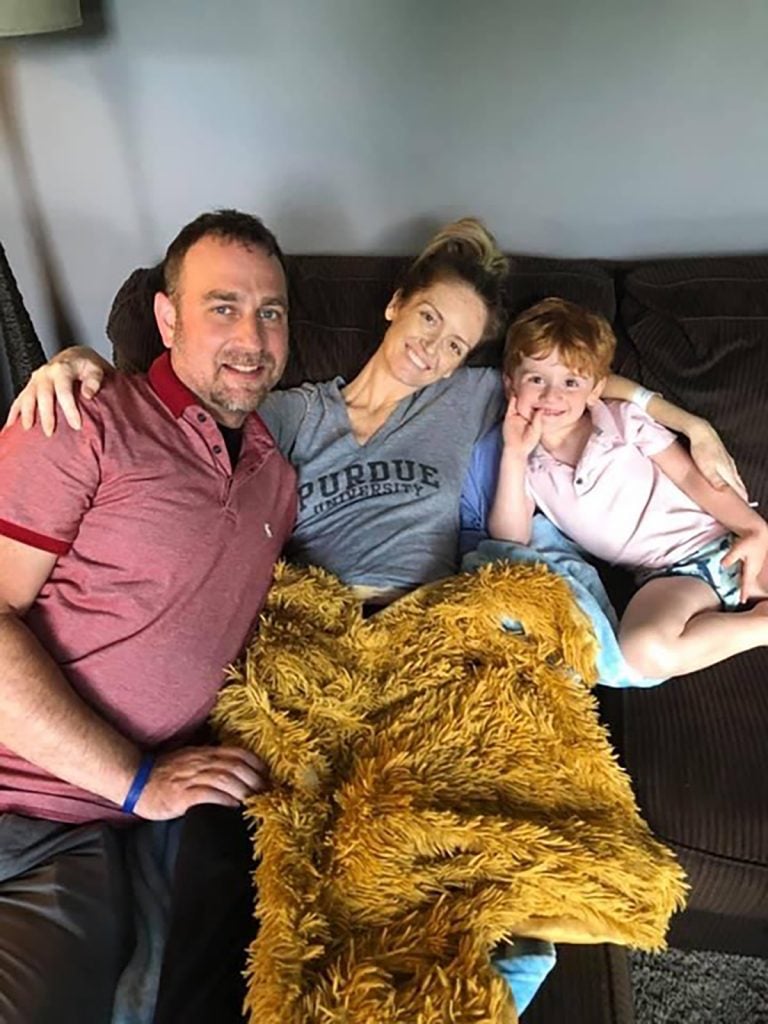Lindy Thackston Celebrates National Cancer Survivors Day
- Sunday, June 5, was National Cancer Survivors Day, and Indianapolis-based news anchor Lindy Thackston, 41, celebrated by remembering her battle with colon cancer.
- Lindy was diagnosed with colorectal cancer in May 2020. In the spring of 2021, she finally finished all 10 rounds of chemotherapy to fight off her cancer. She also underwent surgery for a spot found in her lung.
- Today, Lindy is cancer-free and enjoying life with her family!
"There is a national day for everything but this one I will celebrate," she posted to Instagram on Sunday evening.
Read MoreView this post on Instagram
Understanding Colon Cancer
Colorectal cancer affects your large intestine (colon) or the end of your intestine (rectum).
The cancer starts when abnormal lumps called polyps grow in the colon or rectum. If you don't have these polyps removed, they can sometimes turn into cancer. It takes up to 10 years for a colon polyp to become full-blown cancer, so if you get the recommended screenings, then your doctor will have time to remove any polyps that form before they can cause problems.
Stages 1 through 3 colon cancers are cancers that haven't spread far from the colon. Because of this, there's the potential for a cure with surgical resection.
Generally, surgery is recommended for anyone with stage 1, 2 or 3 colon cancer, though people with stage 2 and 3 cancers may need both surgery and chemotherapy. Even if surgery is successful at removing your cancer, there are always risks. That can mean anything from an infection that’s treated with antibiotics, to a problem with the surgery itself that requires another procedure to correct.
The risk of complications is higher for older people and those who have other medical problems (like heart and lung disease). In these situations, your surgeon can help you decide whether surgery is the right option for you, and what other choices you might have to prolong your life while also maintaining your quality of life.
While early stage colorectal cancer has good survival rates, in the later stages of this disease (Lindy Thackston was fighting stage 4 colon cancer), treatment can get a little more complex. It’s important for you and your doctor to understand as much as possible about your cancer, so that you can make the right decisions about your care.
Lindy Thackston's Cancer Battle
Lindy Thackston, a beloved television news anchor for FOX59 News in Indianapolis, was diagnosed with stage 3 colorectal cancer in May 2020. In the spring of 2021, she finally finished all 10 rounds of chemotherapy to fight off her cancer.
But in September of that year, she shared that doctors found a spot on her lung during an unrelated hospital visit. She told her thousands of Instagram followers that the lung spot prompted a biopsy, which revealed the cancer had spread to her lung her cancer had reached stage 4.
In an episode of her podcast, Life With Lindy, posted that same month, she further explained that her doctors think the spot on her lung had been there from the very beginning when she was diagnosed with stage 3 colorectal cancer.
Management of Metastatic Colon Cancer
Lindy disclosed to SurvivorNet during a previous interview that this discovery also meant she was actually stage 4 when she was diagnosed in May 2020, considering the cancer had spread beyond its origin organ. But the spot was small; it never changed or did anything the entire time she battled colorectal cancer, she said.
"That's actually good news because it means a new spot didn't pop up," she told SurvivorNet.
Dr. Heather Yeo, a surgical oncologist and colorectal surgeon at New York-Presbyterian/Weill Cornell Medical Center, previously told SurvivorNet that when colon cancer spreads outside the colon, "most commonly spreads to the lung and to the liver." In Lindy's case, it had spread to her lung.
Lindy ended up having a lobectomy procedure (surgery where an entire lobe of the lung is removed) to remove half of her left lung.
"Then the question was, 'OK, do I do a round of chemo after that, or not?'" Lindy said.
She consulted with her oncologist at St. Vincent Hospital (in Indianapolis) about what her next steps should be chemotherapy, or not. She also sought second opinions on what to do at Indiana University Health and the Mayo Clinic.

"I had IU and Mayo (Clinic) telling me that they would not do chemo and that they would just continue to constantly monitor me," she told SurvivorNet. "My oncologist, who I've been going to for the whole time, was leaning toward chemo. And I obviously didn't want to do it. … We ultimately decided not to do it."
"It was just a personal decision," she added, "and so (at that point), it was time to take another Signatera test again." (The Signatera blood test can detect if cancer is still present in patients who have previously been diagnosed with cancer; its results can be helpful to patients as they determine their treatment regimen.)
"Hopefully it's negative again," she added. "If it's positive, then I'm gonna have to figure out where the cancer is and start over."
Luckily for Lindy, that test result came back negative, so she doesn't have to start from square one again!
She took another Signatera in early April her third and she continues to return negative results, meaning she’s cancer-free! But her doctors will continue to monitor her remission progress with PET scans every three months.
Learn more about SurvivorNet's rigorous medical review process.

